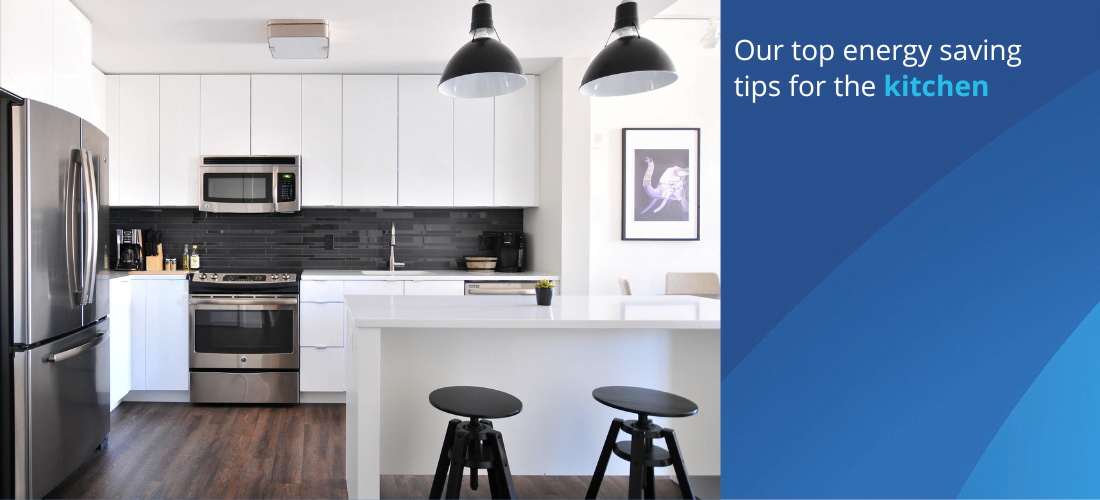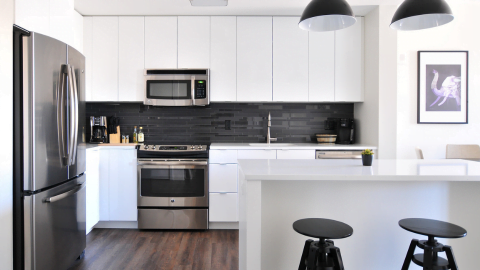In today’s world, energy-saving has become a crucial aspect of our daily lives. It’s essential to conserve energy not only to reduce our carbon footprint but also to save money on our energy bills. One area where we can significantly reduce our energy consumption is in our kitchens, particularly with our kitchen appliances. In this blog, we’ll explore some top energy saving tips with kitchen appliances.
Refrigerator
Refrigerators are one of the most energy-consuming appliances in your home. Try these energy saving tips to reduce your refrigerator’s energy consumption.
- Set the temperature correctly: The ideal temperature range for a refrigerator is between 3 to 5 degrees Celsius. Anything colder than that will consume more energy. Use a thermometer to ensure that your fridge is set to the correct temperature. Your freezer compartment should be set at -18°C.
- Keep your refrigerator full: When your refrigerator is full, it retains cold air better, which means it doesn’t have to work as hard to maintain the temperature. However, be sure not to overfill it, as this can restrict airflow and cause your fridge to use more energy.
- Keep the coils clean: The coils on the back of your refrigerator need to be cleaned regularly. Dust and debris can build up on the coils, which makes your refrigerator work harder to cool, and consume more energy.
- Check the door seals: If the door seals on your fridge are damaged or loose, cold air can escape, which means your refrigerator will have to work harder to maintain the temperature. Check the seals regularly and replace them if necessary.
- Don’t keep the door open for too long: Every time you open your refrigerator, cold air escapes, and warm air enters. The longer you keep the door open, the harder your refrigerator has to work to cool back down. So, try to keep the door open for as little time as possible.
- Deep clean your refrigerator: Deep cleaning your refrigerator will remove unpleasant odours and help it run more efficiently. If your fridge is dirty or cluttered it will cause your appliance to work extra hard in order to keep all its contents cold. This can result in a rise in your energy bill. Check out our guide to deep cleaning your refrigerator.
Dishwasher
Use your dishwasher efficiently and maintain it regularly to ensure it’s running at peak efficiency with our top energy tips.
- Run your dishwasher only when it’s full: Running your dishwasher when it’s only half full wastes water and energy. Wait until you have a full load before running it.
- Use the energy-saving cycle: Many modern dishwashers have an energy-saving cycle option. This setting uses less water and energy to clean your dishes, and it’s just as effective as the standard cycle.
- Scrape off excess food before loading: Scrape off any excess food scraps or debris from your dishes before placing them in the dishwasher. This helps the dishwasher work more efficiently and reduce the need for extra cleaning cycles.
- Use the dishwasher’s load sensors: Many dishwashers have load sensors that detect how dirty your dishes are and adjust the water and energy use accordingly. Make sure to use this feature to help reduce the amount of water and energy consumed.
- Skip the pre-rinse cycle: Unless you have very dirty dishes, there’s no need to use the pre-rinse cycle. Instead, scrape off any excess food, and let the dishwasher do the rest. Check out our guide to loading your dishwasher the right way.
- Air dry your dishes: Skip the heat dry cycle and allow your dishes to air dry instead. This can save a lot of energy and still get your dishes dry.
- Inspect your door seal: Grab your sponge and warm soapy water and wipe down your dishwasher door seal. If you have noticed that your dishwasher has been leaking, do inspect your seal for any signs of wear and tear and replace a cracked or damaged seal.
- Clean and maintain your dishwasher: A well-maintained dishwasher is more efficient and uses less energy. Clean your dishwasher regularly and replace any worn-out or damaged parts.
Oven energy saving tips
- Check out your oven seal: Inspect your door seal for any signs of wear or tear, defects or warping. A faulty seal means your oven will use more energy to maintain the right temperature. If you see any damage, you will need to replace your seal. Replacing your seal is quick and easy. Check out our guide: Replace your oven door seal in 4 easy steps.
- Keep your oven door closed: Instead of opening the oven door frequently to check on your food, use the oven light. Every time you open the oven door, heat escapes, and your oven has to work harder to maintain the temperature.
- Keep your oven clean: A dirty oven can reduce its efficiency and cause it to use more energy. Regularly clean your oven to ensure it’s running at peak efficiency. Clean your oven naturally with spotless results with our handy guide.
- Use the self-cleaning function wisely: The self-cleaning function on ovens uses a lot of energy. Use it only when necessary, and follow the manufacturer’s instructions to ensure it’s being used correctly.
- Bake multiple dishes at once: When baking multiple dishes, try to bake them at the same time. This saves energy, and your oven works more efficiently.
- Use convection mode: Convection mode circulates hot air throughout the oven, which means your food cooks faster and more evenly. This saves energy and reduces cooking time.
- Turn off the oven a few minutes early: Turn off the oven a few minutes before the cooking time is up. The residual heat will continue to cook your food, and you’ll save energy.
Gas cooktop
- Choose the right size cookware: Choose cookware that’s appropriately sized for your gas burners. Using small cookware on large burners wastes energy, while using large cookware on small burners takes longer to heat up, wasting gas.
- Use the right type of cookware: Choose cookware with a flat and even base. This ensures that the heat is distributed evenly, reducing the need for higher gas settings.
- Keep the burners clean: Clean the burners regularly to ensure they’re functioning at peak efficiency. Dirty burners can cause uneven heating and waste gas. We show you how to get your cooktop looking good as new in our easy guide.
- Turn off the gas when not in use: Turn off the gas when you’re not using your cooktop. Even a low flame uses gas and contributes to your energy bills.
- Use the right flame size: Use the smallest flame possible that effectively heats your cookware. Using a higher flame than necessary wastes gas and contributes to your energy bills.
- Use a lid: Use a lid when cooking to retain heat and reduce the need for higher gas settings.
- Avoid preheating: Gas cooktops heat up quickly, so preheating isn’t necessary. Skipping preheating saves gas and reduces your energy bills.
Rangehood
- Use the right size rangehood: Choose a rangehood that’s appropriately sized for your stovetop. An oversized rangehood will consume more energy than necessary, while an undersized one won’t be effective in removing smoke and grease.
- Use the rangehood only when necessary: Turn on the rangehood only when you’re cooking. Leaving it on unnecessarily wastes energy.
- Use the lowest setting: Use the lowest setting that effectively removes smoke and fumes. Higher settings consume more energy.
- Clean your rangehood filters regularly: A dirty rangehood will reduce its efficiency and cause it to use more energy. Clean it regularly to ensure it’s running at peak efficiency. No time to soak? Pop your aluminium or stainless-steel filters in the dishwasher and put through a hot cycle. The steam will loosen particles and the water spray will get into all those nooks. Find out more on our blog.
- Use LED lighting: If your rangehood has lighting, consider using energy-efficient LED bulbs instead of traditional incandescent bulbs. LED bulbs use less energy and last longer.
Coffee Machine
- Turn off the machine when not in use: Turn off your coffee machine when you’re not using it. Leaving it on unnecessarily wastes energy.
- Clean your coffee machine regularly: A dirty coffee machine can reduce its efficiency and cause it to use more energy. Clean it regularly to ensure it’s running at peak efficiency.
- Descale your coffee machine: For a deep clean, descale your coffee machine. This will improve the efficiency of your machine by removing scales from thermos blocks and steam valves
We recommend Aktivo cleaning products for your coffee machine:
- Aktivo Coffee Machine Descaler – Improves the efficiency of appliances by removing scale from thermos blocks and steam valves.
- Espresso Machine Cleaner by Aktivo – Removes coffee and oily residue from espresso machines via the backflushing method.
- Aktivo Milk Frother Cleaner/Sanitiser – Removes milk residue and kills Salmonella, Listeria and E Coli.
Put our energy saving tips to good use in your kitchen. You will not only reduce the impact on the environment, you will also save money and create a more sustainable home.
Find all your spare parts at Statewide Appliance Spares
Statewide Appliance Spares is your go-to destination for all your home appliance spares. You will find parts for your dishwasher, oven & cooktop, fridge & freezer and rangehood plus the complete range of Aktivo cleaning products. The biggest range of spare parts for all the top brands, ready for fast Australia wide shipping. Need help finding the right spare part for your home appliance? Our friendly team are on hand, ready to help! Call us on Free call 1800 005 220.
All the latest on the Statewide blog
Visit our blog for more energy tips. You can also find the best cleaning products for your home and our DIY tips to keep your appliances running like new.
Check out your YouTube channel
Subscribe to our YouTube channel and keep up to date on all our latest videos. We share all the expert hints and tips to make appliance repairs a breeze!


